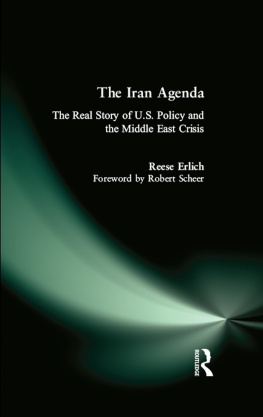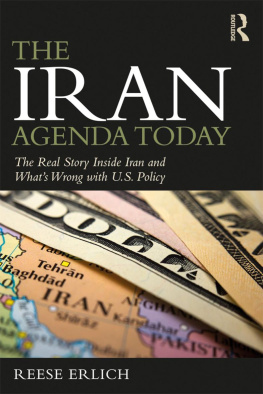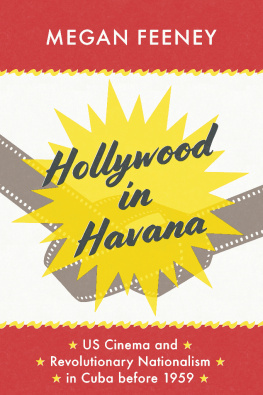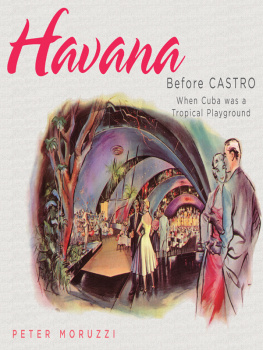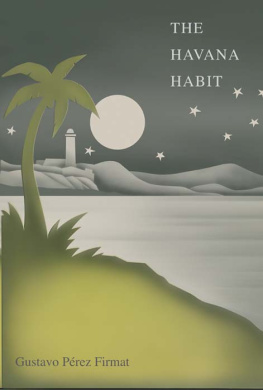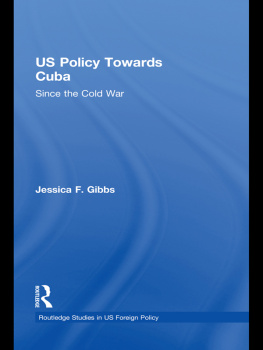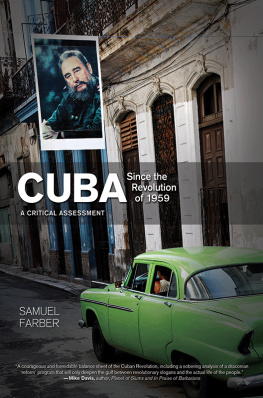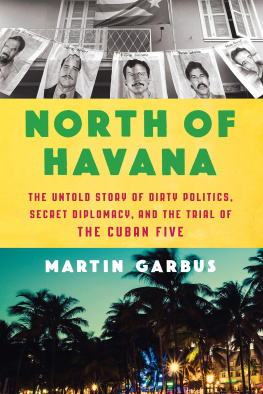Dateline Havana: The Real Story of U.S. Policy and the Future of Cuba
First published 2009 by Paradigm Publishers
Published 2016 by Routledge
2 Park Square, Milton Park, Abingdon, Oxon OX14 4RN
711 Third Avenue, New York, NY 10017, USA
Routledge is an imprint of the Taylor & Francis Group, an informa business
Copyright 2009 by Reese Erlich.
All rights reserved. No part of this bookmay be reprinted or reproduced or utilised in any form or by any electronic, mechanical, or other means, now known or hereafter invented, including photocopying and recording, or in any information storage or retrieval system, without permission in writing from the publishers.
Notice:
Product or corporate names may be trademarks or registered trademarks, and are used only for identification and explanation without intent to infringe.
Portions of this book appeared in a different form in Meanwhile Back in Havana, The East Bay Monthly magazine, November 1999, and in Crack in Cuban Embargo Is Wide Enough for Pianos, Christian Science Monitor, January 9, 1996.
Book design: BookMatters
LIBRARY OF CONGRESS CATALOGING-IN-PUBLICATION DATA
Erlich, Reese.
Dateline Havana : the real story of U.S. policy and the future of Cuba/Reese Erlich.
p. cm.
Includes bibliographical references.
ISBN (alk. paper)
1. Cuba History 1990 2. United StatesRelations Cuba. 3. CubaRelationsUnited States. I. Title.
F1788.E69 2009
972.91064--dc22
2008041312
ISBN 13: 978-0-9815769-7-8 (hbk)
Stephen Kinzer
Set in an azure sea almost within sight of the United States, Cuba has always beckoned Americans. It is a tantalizing presence, mysterious and romantic but also a vivid symbol of historys tormented path. Tyranny, anticolonial rebellion, betrayal, gangster rule, debauchery of every sort, revolution, fiery anti-Americanism, and even a brief fling as a global strategic powerall of these have shaped Cubas turbulent history.
Today Cuba is at a moment of historic transition. The long rule of Fidel Castro is over, and a new era is beginning. No one can be sure what it will bring. Every scenario from stable democracy to civil war is imaginable.
This uncertainty alone, in a country that has for generations fascinated the United States and the wider world, makes the story of todays Cuba important. It is also important for at least two other reasons. First, the course of events in Cuba, for better or worse, will inevitably have security implications for the United States, perhaps serious ones. Second, the success or failure of Cuba in the years to come will help shape the way future generations assess Fidel Castros presidency. If Cuba makes a peaceful transition, many will argue that Castros policies were successful. If political or even military upheaval leads Cuba toward the abyss of instability, Castro will be compared with Yugoslavias Marshall Tito, his legacy stained by his failure to create a political system that could outlive him.
As this drama begins to unfold, outsiders who want to understand todays Cuba need a guide. Dateline Havana is an especially useful one. It is a portrait of Cuban society as it enters a period of great uncertainty. For those of us who cant visit Cuba personally, it is a chance to penetrate the curtain of demonization with which successive American presidents have sought to shroud Cuba. Because Cuba is such a vibrant place, overflowing with a vigor that expresses itself from the kitchen to the music hall to the baseball field, this is a wonderful trip.
American interest in Cuba is at least as old as the Republic. Presidents since Thomas Jefferson have dreamed of bringing Cuba under U.S. rule. They, like many ordinary Americans, considered it a natural part of the United States, and have assumed that the Stars and Stripes would one day fly over Morro Castle in Havana. Some nineteenth-century demagogues even came up with a geological rationale to support this cause; the island of Cuba, they said, must have been formed from sand and rock that had washed away from Florida, so it should logically belong to the United States.
Cubans, not surprisingly, saw their condition otherwise. In the late nineteenth century, they organized large-scale rebellions against Spanish rule that were directed in part from Florida and New Yorkanother example of the close bond between the two countries. As Cuban rebels were approaching victory, the United States offered to send help. The rebels gratefully accepted, but only after the U.S. Congress passed a lawthe Teller Amendmentpledging to make Cuba free and independent and disclaiming any disposition or intention to exercise sovereignty, jurisdiction, or control over said island.
American and Cuban troops finished off the dying Spanish force in short order during the summer of 1898 in what the American statesman John Hay called a splendid little war. That set the stage for one of the great diplomatic betrayals in Western Hemisphere history. With the Spanish defeated, Cuban patriots set off toward the independence the United States had pledged to accept. They were stunned when Congress and President William McKinley announced that they had decided not to observe the Teller Amendment. Instead of allowing Cuba to become independent, the United States turned it into a protectorate. Cuba became the first Caribbean victim of Americanwhat shall we call it?expansionism, imperialism, colonialism, or simply, as Senator Henry Cabot Lodge named it more than a century ago, the large policy.
For more than half a century after the Spanish-American War, the United States remained the dominant power in Cuba. Americans ruled the island directly for a time, through military governors, and then through a series of pliant dictators. The economy was dominated by wealthy Americans and their Cuban partners, first in the sugar industry and then in tourism, gambling, and prostitution, often in cooperation with organized crime barons from el norte. The majority of Cubans lived in poverty.
The explosion came with Castros revolutionary victory in 1959. In his first speech as victorious leader, he pledged that this time it will not be like 1898, when the Americans came and made themselves masters of the country. It was a vivid example of how a nations collective resentment of intervention, occupation, and exploitation can fester over decades and then explode in unexpected ways.
Here is a country that you would believe, on the basis of our history, would be one of our real friends, a perplexed President Dwight Eisenhower mused after Castros takeover. I dont know what the problem is.
Washington and Havana soon became bitter enemies. The Central Intelligence Agency (CIA) sponsored various attempts to assassinate Castro or overthrow his regime, most memorably the failed Bay of Pigs invasion in 1961. Then, for the next half century, the United States enforced a trade embargo, making it illegal for Americans to do business with Cuba. This allowed Castro to claim quite plausibly that Washington was engaged in yet another round of its age-old imperial campaign against Cuba. That argument drew many patriotic Cubans to his side.


